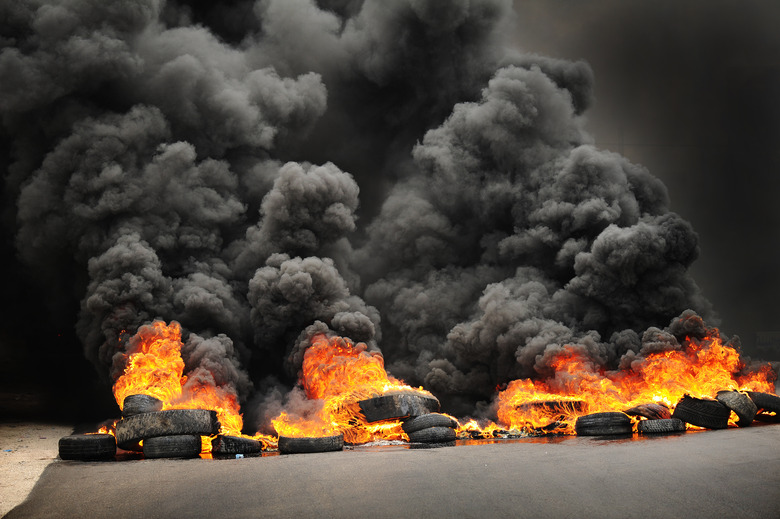Hazards Of Breathing Oil Smoke
Breathing in oil smoke, as anyone who has ever endured the experience well knows, is exceedingly unpleasant. But more than being a transient annoyance, inhaling the fumes created by the combustion of petroleum products can have both short- and longer-term health hazards. Acutely, these effects center primarily on the respiratory system, whereas over the long term they can affect a variety of organ systems. The hazards result from both the physical effects of inhaling smoke regardless of its molecular composition and the chemical effects created by the way in which specific molecules interact with the body's cellular apparatus; the latter are often not immediately evident and are thus more insidious.
The hazards of breathing in smoke, especially to those who work in the petroleum industry, are one reason to favor a shift toward alternative energy sources, even if they are not as great a focal point in the media as the effects of greenhouse gases on Earth's climate.
Cooking Oils in the Kitchen
Cooking Oils in the Kitchen
Cooking in both private and industrial kitchens involves levels of combustion that create products that can pose respiratory and other health hazards. In some cases, they are compounds created at high temperatures by the breakdown or fusion of other, mostly benign products; these compounds include polycyclic aromatic hydrocarbons (PAHs) and similar substances. But in other cases, it is the addition of oils to foods, as with frying, that is directly dangerous under conditions of poor ventilation. Aerosolized droplets of the fats in the cooking oils can enter the respiratory tree and irritate the mucosa, or lining, of the windpipe and bronchi. These effects can be observed in a decrease in forced expiratory volume (FEV) in pulmonary function tests administered to people who have been exposed to these processes. Though the long-term effects are not known, it is clearly a good idea to use adequate ventilation when using cooking oils or preparing foods at high temperatures.
Weaponized Oil Fields
Weaponized Oil Fields
American soldiers in the Persian Gulf in 1991 faced an unusual adversary: burning oil fields. Iraqi forces that had commandeered oil fields in Kuwait chose to set these on fire to stymie advancing U.S. military members, often enveloping them in dense clouds of oil smoke low to the ground for extended periods.
Particulate matter from oil well fires can cause an array of known short-term health effects: skin irritation; runny nose; cough; shortness of breath; irritation of the eyes, nose, and throat; and a worsening of existing of sinus and asthma problems. It is unknown at this time if this can lead to any longer-term consequences, but oil smoke has been implicated as a possible contributor to the "Gulf War syndrome" that afflicts thousands of U.S. veterans today.
Home Heating Oil
Home Heating Oil
Heating oil, or fuel oil, is considered a hazardous substance. Because millions of people use fuel oil to heat their homes in the winter, even if only a small percentage of homes are affected by leakages or spills, the total number of people exposed over the course of a given winter may still be significant.
Even if the spilled fuel oil does not catch on fire (a hazard unto itself) and generate visible smoke, the invisible fumes are sufficient to present a number of health risks. These include headaches, nausea and dizziness in the short term, whereas prolonged exposure can cause a variety of serious health problems. If you experience a spill of more than 1 gallon in your home, do not attempt to clean it all up yourself; instead, call the company that delivered the oil or a natural resources hotline for your area.
Diesel Smoke
Diesel Smoke
Diesel fuel, like gasoline, is a mixture of hydrocarbons produced from petroleum. It has different physical and chemical properties than gasoline as a result of its different blend of fossil-fuel ingredients, one of which is the production of thick, dark smoke. In fact, the U.S. military employs diesel fuel at times for this specific "smokescreen" purpose. The smoke can elicit an inflammatory response in lung tissue that persists for up to two weeks, and other immune responses are observed over even longer periods following exposure. Some individuals may be at risk for contact dermatitis, essentially a rash, and possibly gastritis, an inflammation of the lining of the stomach. Some of the health risks of breathing diesel smoke remain under investigation owing to the significant use of diesel fuel throughout the military and civilian ranks.
Cite This Article
MLA
Beck, Kevin. "Hazards Of Breathing Oil Smoke" sciencing.com, https://www.sciencing.com/hazards-breathing-oil-smoke-7195913/. 16 April 2018.
APA
Beck, Kevin. (2018, April 16). Hazards Of Breathing Oil Smoke. sciencing.com. Retrieved from https://www.sciencing.com/hazards-breathing-oil-smoke-7195913/
Chicago
Beck, Kevin. Hazards Of Breathing Oil Smoke last modified March 24, 2022. https://www.sciencing.com/hazards-breathing-oil-smoke-7195913/
